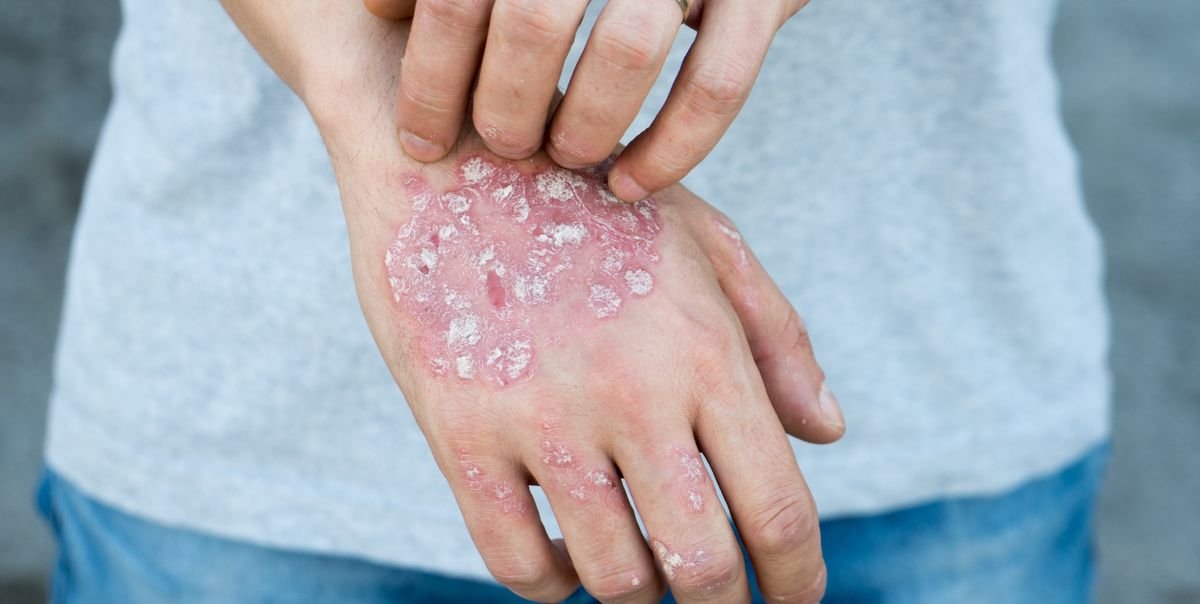Psoriasis
What is Psoriasis ?
Psoriasis is a common, chronic, noncommunicable skin disease, with no clear cause or cure but have a great negative impact on patients’ quality of life. Social exclusion, discrimination and stigma are psychologically more devastating for individuals suffering from psoriasis and patient’s families. It’s the societies’ reaction which leads to more depression for the patient. Here the immune cell mistakenly attacks its own body’s skin cells.
Mostly affected areas are scalp, extensor surface (elbow, knee), lower back, genitalia and fingernails.
Psoriasis can become very unpredictable with respect to its course of symptoms and has a number of external triggers and significant comorbidities, including various types of arthritis, cardio-vascular diseases, metabolic syndrome, inflammatory bowel disease and mental depression.

Why it happens

The etiology of psoriasis remains unclear, but the role of genetic factors in the family history may be a predisposing factor. It can occur in Children or to any mature individuals also. It occurs generally due to malfunctioning of our own immune system but the clear cause of this disease is not yet found. However, certain, factors like external and internal triggers/ provoke the disease to occur and aggravate. Some of the factors are disturbed fat digestion, hormonal imbalance, including mild trauma, sunburn, infections, systemic drugs, mental- physical stress and deficiency of active form of Vitamin D3.
Symptoms
It tends to follow classic of the following triad
- The affected area becomes salmon red in color with sharply demarcated papules.
- Burning and itching.
- Dryness of skin & scaling of the skin.
- Pain associated with swelling.
- The size of the affected area can range from a small tear drop to covering large areas.
- There are some general symptoms also: like Fatigue, Bleeding disposition from the cracks of the skin etc.
- There are some secondary effects of the disease too. The patients often become devastated with the social avoidance ending up in multifaceted mental depression, low self-esteem, anxiety and at times suicidal ideations.
- The size of the affected area can range from a small tear drop to covering large areas.
- There are some general symptoms also: like Fatigue, Bleeding disposition from the cracks of the skin etc.
- There are some secondary effects of the disease too. The patients often become devastated with the social avoidance ending up in multifaceted mental depression, low self-esteem, anxiety and at times suicidal ideations.
Type of Psoriasis
It tends to follow classic of the following triad
- Psoriasis Vulgaris – most common plaque type accounting 90% of all cases.
- Pustular Psoriasis – it may develop after plaque psoriasis or may get triggered by topical therapy, scaling is mostly seen in this type along with fever and nausea, pin head size pustules ( pimple on the skin containing pus ) appear within an hour of onset of fever.
- Guttate psoriasis – it affects approximate 2% of world population, it is second most common type. Most frequently occur in children and young adult with family history of psoriasis followed by streptococcal infection (sore throat and pharyngitis), stressful life. There is a sudden onset of small red scaly plaque like rain drops.
- Erythrodermic psoriasis: Fiery redness with exfoliation of most of the body surface. It is the most serious amongst all type of psoriasis and potentially become life-threatening, because it can lead to severe heat loss (hypothermia), acute deficiency of Albumin (hypoalbuminemia) and often cardiac failure.
- Psoriatic arthritis: Psoriasis can also present along with an inflammatory type of arthritis known as psoriatic arthritis, which involves various joints of the spine and other limb joints. These leads to restricted joint movement, deformity and at times painful swelling of the affected joints.
Basic Care
Primary treatment of psoriasis is majorly based on controlling the symptoms. The need for treatment is usually lifelong and there is frequent reappearance of symptoms occur due to any triggering factors. So far, there is no definitive therapy that can result a complete cure of psoriasis.
Keep the affected area moist.
- Understand your triggers and minimizing exposure to such triggering factors
- Avoid itching/scratching and peeling of the scales.
- Maintain healthy lifestyle and diet.
- Avoid alcohol, smoking, cold climate because these aggravate the condition.
How Homoeopathic treatment can help you?
Homeopathy helps in treating disease in a holistic way by removing root causes lurking behind. Psoriasis is an immune malfunctioning disease with chronicity so each and every case need a thorough study to stop flaring of disease.
There are so many medicine which can be prescribed according to the conditions of the patients like: Arsenicum Album; Petroleum; Sulphur; Sepia ;Mezereum ; Psorinum ; Merc Solubilis; Silicea ; Staphysagria; Rhus Tox etc. It can also help to eventually reduce the effects of the triggering factors, which precipitate the disease easily. The overall well-being becomes improved by carefully selected Homeopathic medications, without any side effects.
Every case are different from one another so medicines are also different for every patients depending on their individualization.